Results
-
£38.50
Stand By
Estimated dispatch 7-14 working days
-
£5.99
Praise!
1Where Eagles SingPaul Lovatt-CooperThe Band of the Welsh Guards supported by The Band of the Life Guards4.322Swingtime ReligionBarrie GottThe Band of the Welsh Guards supported by The Band of the Life Guards3.583ShenandoahLeonard Ballantine arr. Brian BowenThe Band of the Welsh Guards supported by The Band of the Life Guards2.534Deep RiverWilliam BroughtonThe Band of the Welsh Guards supported by The Band of the Life Guards3.535CommitmentStephen BullaThe Band of the Welsh Guards supported by The Band of the Life Guards3.576Christmas JoyErik Leidz?n trs. Brian BowenThe Band of the Welsh Guards supported by The Band of the Life Guards2.197A Carol FantasyEric Ball trs. Stephen BullaThe Band of the Welsh Guards supported by The Band of the Life Guards6.108Angel TrumpetsRichard PhillipsThe Band of the Welsh Guards supported by The Band of the Life Guards3.499Yuletide RagRichard PhillipsThe Band of the Welsh Guards supported by The Band of the Life Guards2.3610Opening CeremonyRichard PhillipsThe Band of the Welsh Guards supported by The Band of the Life Guards4.2811Dance Like DavidAndrew MackerethThe Band of the Welsh Guards supported by The Band of the Life Guards3.0512Waltz in A FlatJohannes Brahms arr. Brian BowenThe Band of the Welsh Guards supported by The Band of the Life Guards1.3913DanielBarrie GottThe Band of the Welsh Guards supported by The Band of the Life Guards2.2614I Vow to Thee, My CountryGustav Holst arr. Ray Steadman Allen trs. Brian BowenThe Band of the Welsh Guards supported by The Band of the Life Guards3.2915PraiseWilfred Heaton trs. Brian BowenThe Band of the Welsh Guards supported by The Band of the Life Guards3.10
Estimated dispatch 7-14 working days
-
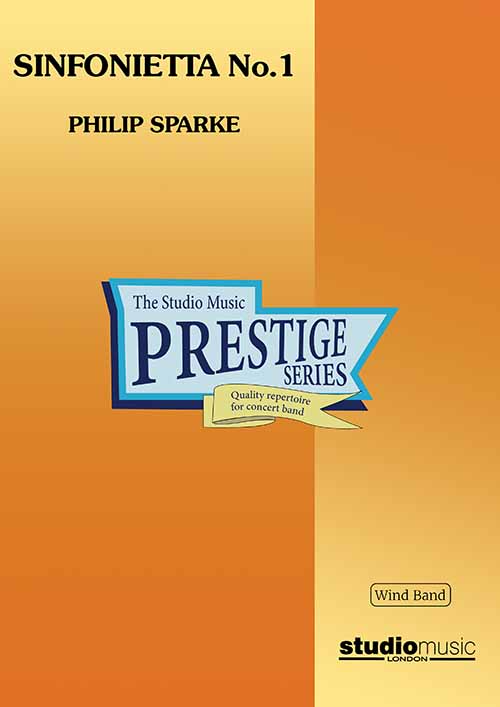 £137.95
£137.95Sinfonietta No.1 (Concert Band - Score and Parts) - Sparke, Philip
Sinfonietta No.1 was commissioned by the Foundation of Friends of the Marine Band of the Royal Netherlands Navy. It was first performed by them in 'De Doelen', Rotterdam on the 13th November 1990 (in a joint concert with the Royal Marines Band from Great Britain) which celebrated the 325th anniversary of the Netherlands Marine Corps and coincided with the 45th anniversary of the band and the 175th anniversary of naval music in the Netherlands.The work is in three, linked movements:I: OvertureSeveral contrasting motivic ideas open the work, but none manage to develop into a theme of any sort. Eventually a short theme appears on clarinet, alto saxophone and horn but it is swept away by runs of triplets from the woodwinds. The theme returns, accompanied by the triplets from the woodwinds. The theme returns, accompanied by the triplets, and this leads to a return of the opening material to close the movement.II: AriaThe second movement opens with violent outbursts from the timpani until a simple, mournful tune is presented by flute and bassoon over a sparse accompaniment by the lower brass. Trumpets introduce a quicker, turbulent central section but this leads back to a brief repeat of the original tune, bringing the movement to a peaceful close.III. ScherzoThe final movement is a fast and furious scherzo which bursts into life with a flurry of notes. The vivacious main (woodwind) theme is first played by the flutes and then by the whole woodwind section. A cornet then takes centre stage with a fanfare-like theme which is then taken up by the brass. A bridge passage then leads to a version of this theme for full band. The original flute tune is then developed until the horns introduce a chorale tune which is taken up by saxes and then full band until the opening material reappears. The woodwind and brass themes are then combined and lead to a forceful version of the chorale which becomes more and more dissonant until the opening of the Overture returns to bring the work to a rousing finish.Recorded on QPRM134D THE KINGS GO FORTH, Central Band of the Royal Air Force
Estimated dispatch 7-14 working days
-
 £27.95
£27.95Sinfonietta No.1 (Concert Band - Score only) - Sparke, Philip
Sinfonietta No.1 was commissioned by the Foundation of Friends of the Marine Band of the Royal Netherlands Navy. It was first performed by them in 'De Doelen', Rotterdam on the 13th November 1990 (in a joint concert with the Royal Marines Band from Great Britain) which celebrated the 325th anniversary of the Netherlands Marine Corps and coincided with the 45th anniversary of the band and the 175th anniversary of naval music in the Netherlands.The work is in three, linked movements:I: OvertureSeveral contrasting motivic ideas open the work, but none manage to develop into a theme of any sort. Eventually a short theme appears on clarinet, alto saxophone and horn but it is swept away by runs of triplets from the woodwinds. The theme returns, accompanied by the triplets from the woodwinds. The theme returns, accompanied by the triplets, and this leads to a return of the opening material to close the movement.II: AriaThe second movement opens with violent outbursts from the timpani until a simple, mournful tune is presented by flute and bassoon over a sparse accompaniment by the lower brass. Trumpets introduce a quicker, turbulent central section but this leads back to a brief repeat of the original tune, bringing the movement to a peaceful close.III. ScherzoThe final movement is a fast and furious scherzo which bursts into life with a flurry of notes. The vivacious main (woodwind) theme is first played by the flutes and then by the whole woodwind section. A cornet then takes centre stage with a fanfare-like theme which is then taken up by the brass. A bridge passage then leads to a version of this theme for full band. The original flute tune is then developed until the horns introduce a chorale tune which is taken up by saxes and then full band until the opening material reappears. The woodwind and brass themes are then combined and lead to a forceful version of the chorale which becomes more and more dissonant until the opening of the Overture returns to bring the work to a rousing finish.Recorded on QPRM134D THE KINGS GO FORTH, Central Band of the Royal Air Force
Estimated dispatch 7-14 working days
-
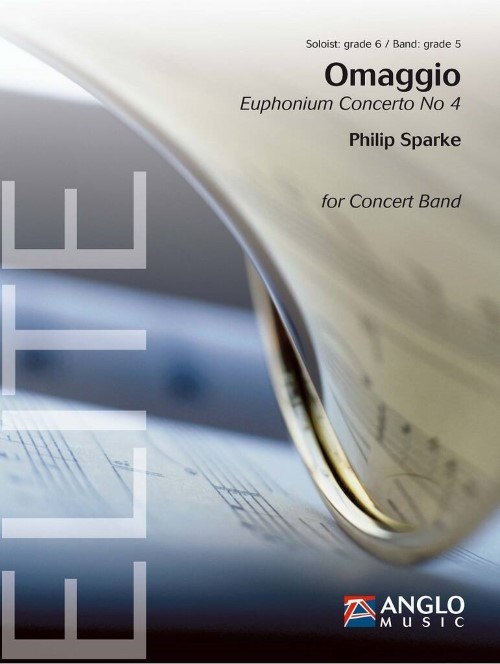 £206.99
£206.99Omaggio (Euphonium Concerto No.4) (Euphonium Solo with Concert Band - Score and Parts) - Sparke, Philip
Omaggio was commissioned by Steven Mead in celebration of his 60th birthday and in memory of his father, Rex. He gave the premiere of the brass band version in Rome in March 2022, accompanied by the Italian Brass Band conducted by Filippo Cangiamilla. The concert band premiere took place on 6th July that year as part of the 2022 Spanish International Tuba Euphonium Conference, accompanied by the Banda municipal de msica de Malaga.The concerto is set in 3 continuous movements, which are united by a recurring syncopated interval of a fifth. The first movement, Fantasia, opens with this motive accompanying an extended monologue for the soloist. This is followed by a lengthy bridge passage by the band, which is eventually joined by the soloist, who guides the music back to the opening soliloquy, leading to an energetic central section. This develops until the opening material again returns to introduce the second movement, Ballad, which revolves around an expressive melody for the soloist, interspersed by accompanied cadenzas. The third movement, The King Triumphant, pays homage to Steven's late father, Rex, and its title alludes both to Rex's name (Rex being Latin for king) as well as his love of Eric Ball's Salvationist masterpiece, The Kingdom Triumphant. The finale is an energetic tour-de-force featuring an acrobatic 6/8 melody, which is interrupted twice by the magnificent hymn tune, Helmsley, which Ball uses so effectively in The Kingdom Triumphant. A galloping coda brings the work to a close.
Estimated dispatch 7-14 working days
-
 £206.99
£206.99Omaggio - Philip Sparke
Omaggio was commissioned by Steven Mead in celebration of his 60th birthday and in memory of his father, Rex. He gave the premiere of the brass band version in Rome in March 2022, accompanied by the Italian Brass Band conducted by Filippo Cangiamilla. The concert band premiere took place on 6th July that year as part of the 2022 Spanish International Tuba Euphonium Conference, accompanied by the Banda municipal de msica de Mlaga. The concerto is set in 3 continuous movements, which are united by a recurring syncopated interval of a fifth. The first movement, FANTASIA, opens with this motive accompanying an extended monologue for the soloist. This is followed by a lengthy bridge passage by the band (piano), which is eventually joined by the soloist, who guides the music back to the opening soliloquy, leading to an energetic central section. This develops until the opening material again returns to introduce the second movement, BALLAD, which revolves around an expressive melody for the soloist, interspersed by accompanied cadenzas. The third movement, THE KING TRIUMPHANT, pays homage to Steven's late father, Rex, and its title alludes both to Rex's name ('Rex' being Latin for 'king') as well as his love of Eric Ball's Salvationist masterpiece, The Kingdom Triumphant. The finale is an energetic tour-de-force featuring an acrobatic 6/8 melody, which is interrupted twice by the magnificent hymn tune, Helmsley, which Ball uses so effectively in The Kingdom Triumphant. A galloping coda brings the work to a close.
Estimated dispatch 7-14 working days
-
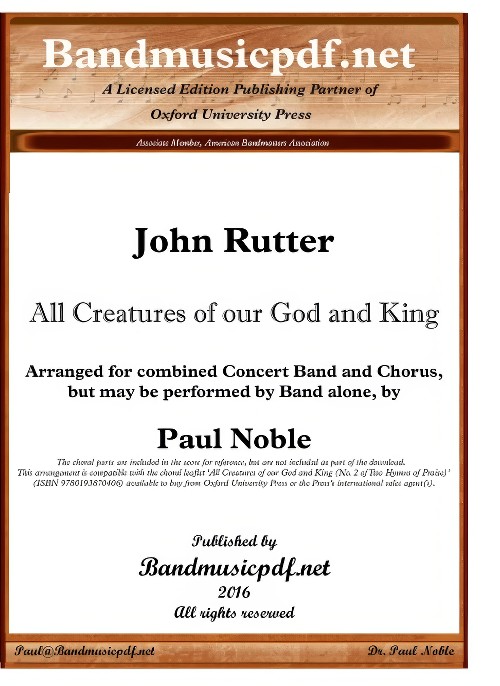 £110.00
£110.00All Creatures of our God and King (Concert Band with Optional Choir - Score and Parts) - Rutter, John - Noble, Paul
All Creatures of Our God and King is an English Christian Easter hymn by William Henry Draper, based on a poem by St. Francis of Assisi. It was first published in a hymn book in 1919. The words of the hymn were initially written by St. Francis of Assisi in 1225 in the Canticle of the Sun poem, which was based on Psalm 148. The words were translated into English by William Draper, who at the time was rector of a Church of England parish church at Adel near Leeds. Draper paraphrased the words of the Canticle and set them to music. It is not known when Draper first wrote the hymn but it was between 1899 and 1919. The hymn is currently used in 179 different hymn books. The words written by St Francis are some of the oldest used in hymns after Father We Praise Thee, written in 580 AD. Like Ye Watchers and Ye Holy Ones, Draper's text is usually set to the tune of Lasst uns erfreuen, a German Easter hymn published by Friedrich Spee in 1623 in his book Auserlesene Catholische Geistliche Kirchengesng. This tune became widespread in English hymn books starting with a 1906 arrangement by Ralph Vaughan Williams. John Rutter also wrote a piece of music for the hymn. Despite the hymn being initially written by Draper for Whitsun (the Anglican and English designation for Pentecost), it is mostly used in the ealier weeks of the Easter season. This setting by John Rutter begins with a rousing fanfare for trumpets and trombone, which segues in to the first verse of the hymn. There are seven verses included, but the director has the option of deleting verses as desired.
Estimated dispatch 7-14 working days
-
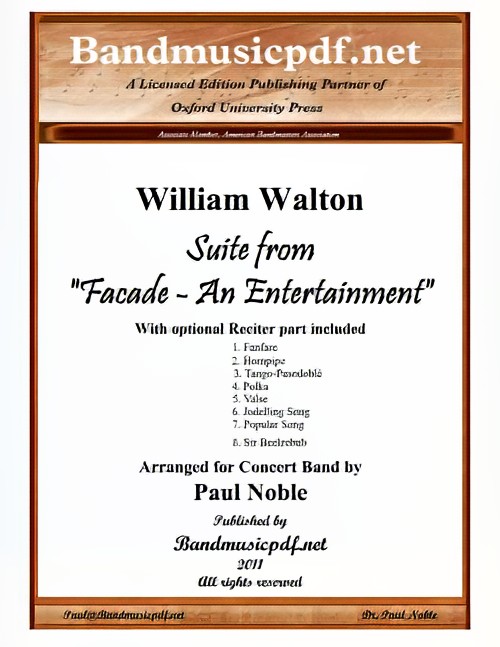 £375.00
£375.00Facade - An Entertainment, Suite from (Concert Band with Optional Narrator - Score and Parts) - Walton, William - Noble, Paul
This Suite from Facade - An Entertainment, composed by William Walton, with poems by Dame Edith Sitwell, presents for the first time a grouping of movements selected and arranged by Paul Noble for Concert Band and optional Reciter. The original composition was written between 1921 and 1928, containing forty-three numbers. They had their origin in a new style of poetry that Edith Sitwell evolved in the early 1920s, poems that her brother Osbert later described as 'experiments in obtaining through the medium of words the rhythm and dance measures such as waltzes, polkas, foxtrots... Some of the resulting poems were sad and serious... Others were mocking and gay... All possessed a quite extraordinary and haunting fascination.' Possibly influenced by the dance references in some of the numbers, Osbert declared that the poems might be further enhanced if spoken to a musical accompaniment. The obvious choice of composer was the young man who lived and worked in an attic room of the Sitwell brothers' house in Carlyle Square W[illiam] T[urner] Walton, as he then styled himself. The now historic first performance of the Facade Entertainment took place in an L-shaped first-floor drawing-room on January 24, 1922. Accompaniments to sixteen poems and two short musical numbers were performed by an ensemble of five players. The performers were obscured from the audience by a decorated front curtain, through which a megaphone protruded for Edith to declaim her poems. This was, as she put it, 'to deprive the work of any personal quality'. The first public performance of Facade was given at the Aeolian Hall on June 12, 1923. By now, fourteen poems had been set, others revised or rejected, and an alto saxophone added to the ensemble. The occasion gave rise to widespread publicity, both pro and contra, and the name of the twenty-one year old W. T. Walton was truly launched. In the ensuing years the Facade has gone through revisions and additions, with full orchestral arrangements of selected movements being made without the Reciter. Former Band Director Robert O'Brien arranged some movements for band, again without Reciter, which are now out of print. So this 'history making' addition is the first opportunity for Concert Bands to present some movements of Facade with poems as originally intended. The luxury of electronic amplification allows the full ensemble to perform without necessarily overshadowing the Reciter. And the arrangements are written with considerable doubling so that the ensemble may play in full, or reduced in size as may be desired for proper balance. And, though not encouraged, the arrangements are written so that the band can perform the music without the Reciter. Program notes are adapted in part from those written by David Lloyd-Jones and published by Oxford University Press in the Study Score of William Walton's Facade Entertainments.
Estimated dispatch 7-14 working days
-
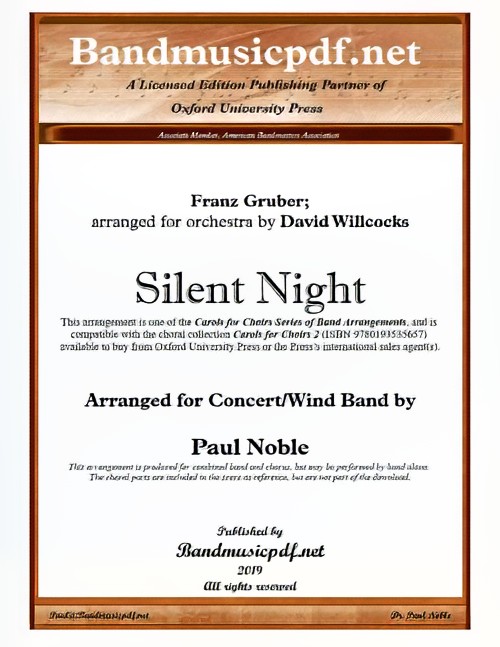 £75.00
£75.00Silent Night (Concert Band with Optional Choir - Score and Parts) - Gruber, Franz - Noble & Willcocks
Silent Night (German: Stille Nacht, heilige Nacht) is a popular Christmas carol, composed in 1818 by Franz Xaver Gruber to lyrics by Joseph Mohr in the small town of Oberndorf bei Salzburg, Austria. It was declared an intangible cultural heritage by UNESCO in 2011. Over the years, because the original manuscript had been lost, Mohr's name was forgotten and although Gruber was known to be the composer, many people assumed the melody was composed by a famous composer, and it was variously attributed to Haydn, Mozart, or Beethoven. However, a manuscript was discovered in 1995 in Mohr's handwriting and dated by researchers as c. 1820. It states that Mohr wrote the words in 1816 when he was assigned to a pilgrim church in Mariapfarr, Austria, and shows that the music was composed by Gruber in 1818. This is the earliest manuscript that exists and the only one in Mohr's handwriting. The song has been recorded by a large number of singers across many music genres. This haunting setting by David Willcocks also includes slight textual alterations to the piece that has been translated into about 140 languages. This arrangement represents one in the Series of Band Arrangements compatible with David Willcocks' Carols for Choirs.
Estimated dispatch 7-14 working days
-
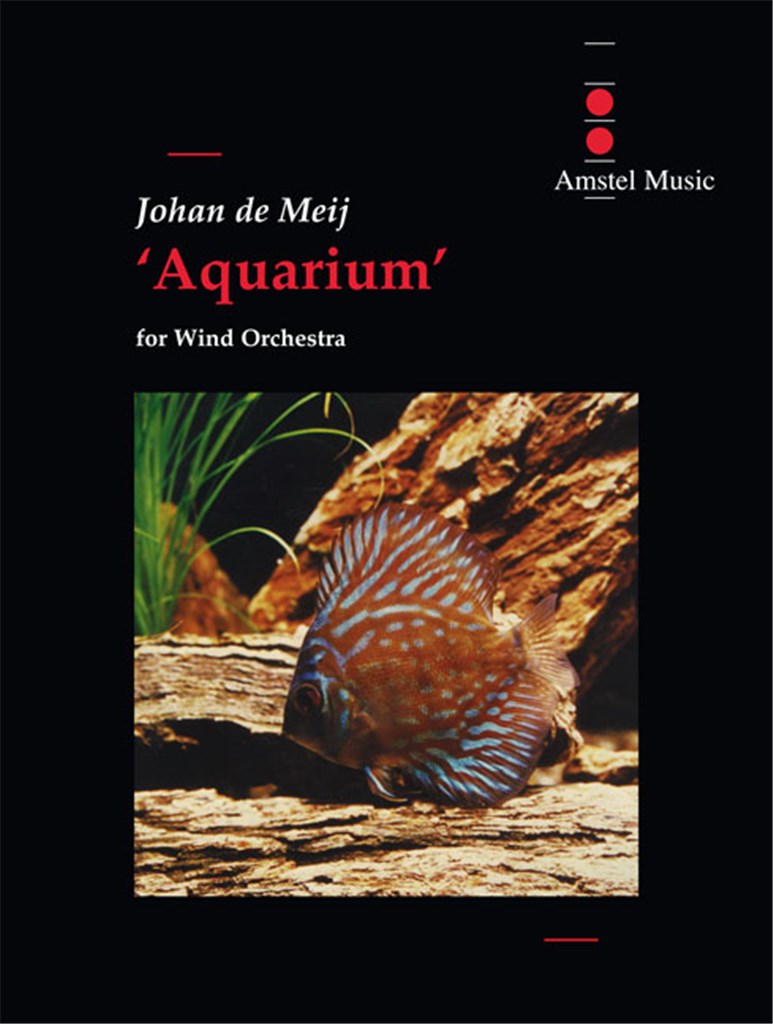 £128.00
£128.00Aquarium (Concert Band - Score and Parts) - De Meij, Johan
The Suite Aquarium is Johan de Meij's third composition for symphonic band and features six tropical fishes, each of them represented by a motif, and surfacing as such in several guises. The composition consists of three movements of which the second and third merge uninterruptedly into each other. I) Allegretto grazioso (Neon Tetra, Electric Eel and Angelfish) II) Andante / Adagio (Sea Horse and Zebrafish) III) Finale: Allegro giocoso (Guppy & Co.) The Neon Tetra motif functions as a kind of 'Leitmotiv' and describes the beautifully coloured, frisky fish: A number of variants have been derived from this theme and will also appear in the other movements. The Electric Eel in fact is not represented by a motif, but by a rhythm based on the restless electric pulses made audible in some aquaria. The Angel fish is represented by elegant cluster chords. In the second movement the Sea Horse emerges out of the water vegetation and starts a dialogue with the Zebrafish, which is represented by one melodic phrase in unison, getting more and more threatening by added parallel fifths and octaves. Simultaneously with the Sea Horse motif the Neon Tetra theme emerges, this time in 3/4 time and in Eb minor. The third movement starts with only two instruments (trumpet and xylophone), but as it is often the case with Guppies their number rapidly increases. Piccolo and Alto Saxophone introduce the Guppy Theme followed by several instrumental combinations. Every theme from the first movement 'swims by' once more, after which the principal motif leads us to a brilliant ending.Duration: 9.00
Estimated dispatch 7-14 working days
